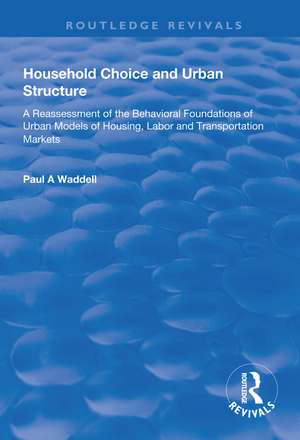Household Choice and Urban Structure: A Re-Assessment of the Behavioural Foundations of Urban Models of Housing, Labor and Transportation Markets: Routledge Revivals
Autor Paul A. Waddellen Limba Engleză Paperback – 30 iun 2020
| Toate formatele și edițiile | Preț | Express |
|---|---|---|
| Paperback (1) | 212.16 lei 6-8 săpt. | |
| Taylor & Francis – 30 iun 2020 | 212.16 lei 6-8 săpt. | |
| Hardback (1) | 552.60 lei 6-8 săpt. | |
| Taylor & Francis – 30 iul 2018 | 552.60 lei 6-8 săpt. |
Din seria Routledge Revivals
- 9%
 Preț: 767.40 lei
Preț: 767.40 lei - 9%
 Preț: 1004.17 lei
Preț: 1004.17 lei - 9%
 Preț: 934.94 lei
Preț: 934.94 lei -
 Preț: 230.80 lei
Preț: 230.80 lei -
 Preț: 294.72 lei
Preț: 294.72 lei -
 Preț: 258.66 lei
Preț: 258.66 lei - 9%
 Preț: 903.41 lei
Preț: 903.41 lei - 18%
 Preț: 695.85 lei
Preț: 695.85 lei -
 Preț: 296.10 lei
Preț: 296.10 lei -
 Preț: 342.36 lei
Preț: 342.36 lei - 9%
 Preț: 606.35 lei
Preț: 606.35 lei -
 Preț: 309.94 lei
Preț: 309.94 lei - 9%
 Preț: 729.99 lei
Preț: 729.99 lei -
 Preț: 256.94 lei
Preț: 256.94 lei -
 Preț: 230.80 lei
Preț: 230.80 lei -
 Preț: 259.47 lei
Preț: 259.47 lei - 9%
 Preț: 903.80 lei
Preț: 903.80 lei -
 Preț: 153.81 lei
Preț: 153.81 lei -
 Preț: 258.66 lei
Preț: 258.66 lei -
 Preț: 294.91 lei
Preț: 294.91 lei -
 Preț: 200.66 lei
Preț: 200.66 lei -
 Preț: 199.85 lei
Preț: 199.85 lei -
 Preț: 308.78 lei
Preț: 308.78 lei -
 Preț: 295.04 lei
Preț: 295.04 lei -
 Preț: 382.23 lei
Preț: 382.23 lei -
 Preț: 258.66 lei
Preț: 258.66 lei -
 Preț: 343.21 lei
Preț: 343.21 lei - 9%
 Preț: 640.90 lei
Preț: 640.90 lei - 9%
 Preț: 605.71 lei
Preț: 605.71 lei -
 Preț: 228.88 lei
Preț: 228.88 lei -
 Preț: 257.67 lei
Preț: 257.67 lei -
 Preț: 245.10 lei
Preț: 245.10 lei -
 Preț: 258.52 lei
Preț: 258.52 lei - 5%
 Preț: 231.22 lei
Preț: 231.22 lei -
 Preț: 368.93 lei
Preț: 368.93 lei -
 Preț: 246.37 lei
Preț: 246.37 lei - 9%
 Preț: 764.34 lei
Preț: 764.34 lei -
 Preț: 258.66 lei
Preț: 258.66 lei -
 Preț: 326.26 lei
Preț: 326.26 lei -
 Preț: 286.98 lei
Preț: 286.98 lei - 8%
 Preț: 418.23 lei
Preț: 418.23 lei -
 Preț: 260.85 lei
Preț: 260.85 lei -
 Preț: 267.15 lei
Preț: 267.15 lei -
 Preț: 295.62 lei
Preț: 295.62 lei -
 Preț: 262.64 lei
Preț: 262.64 lei - 9%
 Preț: 638.61 lei
Preț: 638.61 lei -
 Preț: 341.55 lei
Preț: 341.55 lei -
 Preț: 381.17 lei
Preț: 381.17 lei -
 Preț: 294.53 lei
Preț: 294.53 lei -
 Preț: 294.72 lei
Preț: 294.72 lei
Preț: 212.16 lei
Preț vechi: 256.63 lei
-17% Nou
Puncte Express: 318
Preț estimativ în valută:
40.60€ • 42.13$ • 33.94£
40.60€ • 42.13$ • 33.94£
Carte tipărită la comandă
Livrare economică 15-29 martie
Preluare comenzi: 021 569.72.76
Specificații
ISBN-13: 9781138316324
ISBN-10: 1138316326
Pagini: 138
Dimensiuni: 152 x 219 x 8 mm
Greutate: 0.26 kg
Ediția:1
Editura: Taylor & Francis
Colecția Routledge
Seria Routledge Revivals
Locul publicării:Oxford, United Kingdom
ISBN-10: 1138316326
Pagini: 138
Dimensiuni: 152 x 219 x 8 mm
Greutate: 0.26 kg
Ediția:1
Editura: Taylor & Francis
Colecția Routledge
Seria Routledge Revivals
Locul publicării:Oxford, United Kingdom
Cuprins
1. Introduction. 2. Theoretical Background: Models of Urban Spatial Structure. 3. The Policy Interface. 4. The Region, The Data, and The Model. 5. Results and Interpretation. 6. Conclusions and Directions for Future Research
Notă biografică
Professor Paul Waddell, University of California, Berkeley, USA.
Descriere
Published in 1997. The aim of this book is to explore urban modelling traditions, identify key limitations and contributions and to develop a more general model within a discrete choice framework. The scope of the effort is on household choices regarding residential location, workplace and housing tenure. It is the first systematic effort to analyze the structure and sequence of the choices made by households regarding residential location and workplace. The implications for urban theory, model development and policy analysis are substantial.
